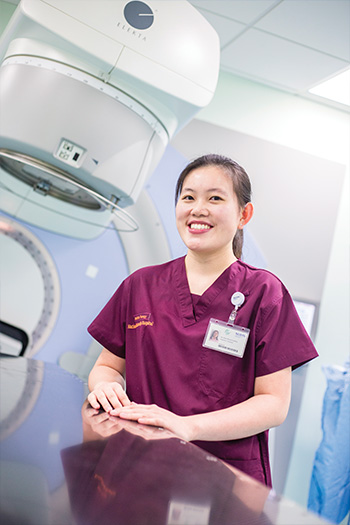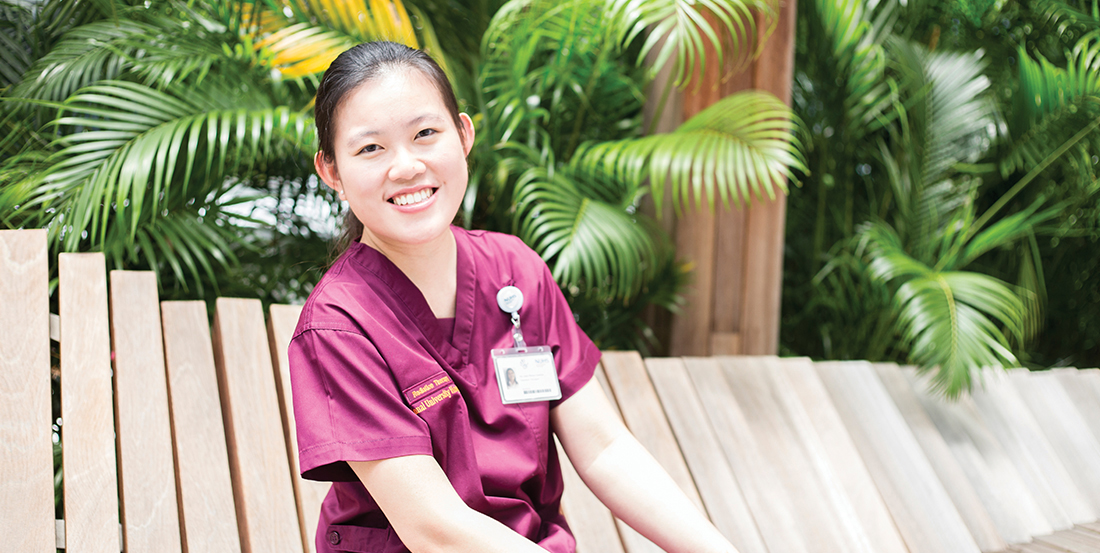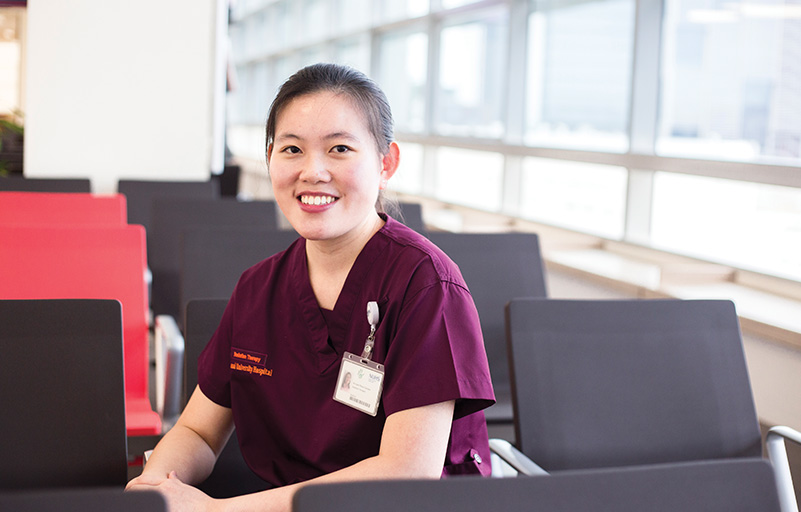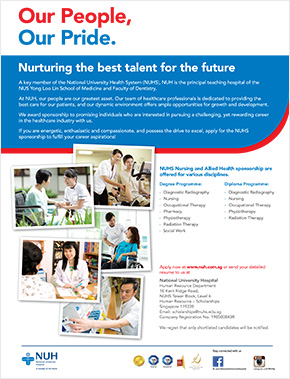Being diagnosed with cancer and undergoing frequent treatment
is a trying time for patients and their families. Healthcare Scholar
Carinne Ho tells us how she ensures a smooth treatment journey
for all involved.
Cancer is a serious ailment that involves
abnormal cell growth which can invade
other parts of the body. Thankfully, an
effective cancer treatment method is radiation
therapy, where ionising radiation is utilised to
kill malignant cells – typically over the course of
several weeks.
Exposure to high levels of radiation can produce
numerous undesirable side-effects such as fatigue,
nausea, hair loss and skin problems. Radiation
Therapists play a crucial role in reassuring patients
and walking them through the treatment to make
their experience less unpleasant.
Healthcare Scholar Carinne Ho, a 25-year-old
Radiation Therapist at the National University
Hospital (NUH), also describes her role as that
of an emotional and moral support system for
her patients (both adults and children). She adds
cheerfully, “I find great fulfilment being there for my
patients during their treatment period and being
able to walk them through this difficult time!”
What Made You Decide To Take Up
The Healthcare Scholarship?
Carinne Ho: I first came to know about the
Healthcare Scholarship via a booth set up in the
University of Sydney campus where I was studying.
I have also known seniors who have taken up this
scholarship and they too encouraged me to apply
for it – in fact, my sister is also a Healthcare Scholar!
In the end, I chose to take up this scholarship as I
can put to practice what I have studied and I was
very certain I wanted to be part of the Singapore
healthcare sector.

"I find great fulfilment being there for my
patients during their treatment period and being
able to walk them through this difficult time!"
Share With Us Some Highlights
Of Your Scholarship Journey In
Australia.
Carinne: During my studies, I attended a
conference in Adelaide where I gained amazing
insights into the advances made in radiation
therapy technology and how it is being adopted
today. My experience at this conference ignited
my desire to conduct more research on radiation
technology – in fact, I spent my final year in
university doing a thesis on and learning more
about radiation therapy from field experts.
Describe Some Of Your Roles And
Responsibilities As A Radiation
Therapist.
Carinne: Radiation Therapists are Allied
Health professionals in the field of radiation
oncology, involved in the simulation, planning and
administration of ionising radiation for cancer
treatment.
I am currently responsible for administering
radiation treatment to cancer patients using
the treatment machine (also known as a linear
accelerator) to generate and administer high energy
radiation to treat cancer safely and accurately.
I also make use of image-guided technology to
locate tumour targets prior to treatment for more
accurate radiation delivery.
Some of my patients may feel anxious while
lying in the treatment room. To make them feel
better, I try putting on some soothing background
music and engage in conversation with them as a
form of reassurance. In addition, I also counsel and advise my patients on possible radiation therapy side-effects they may encounter and how to manage these effectively.
This is where I find myself being a pillar of emotional
support for my patients throughout their treatment period.
Being able to connect with my patients and reassuring
them is what I really look forward to in my job!
Tell Us More About Radiation Therapy
And How It Can Benefit Patients.
Carinne: Radiation therapy is an important
component of cancer management and it can be
used as a primary treatment for cancer or to alleviate
symptoms (such as pain) in advanced or late-stage
cancer where the disease has spread extensively. It
is often combined with other treatment modalities
such as surgery and chemotherapy to produce a more
holistic treatment protocol for patients.
Carinne Ho Juan Phoon
Healthcare Scholar
Designation:
Radiation Therapist,
National University Hospital
Studied:
Bachelor of Medical Radiation
Science (Radiation Therapy),
University of Sydney, Australia
"During my two years with NUH, I’ve been lucky to have
my senior colleagues impart their knowledge to me and teach me the
importance of patient care."
As previously mentioned, image-guidance radiation
therapy helps locate tumour targets prior to treatment.
Thanks to technological advances, we are now able to carry
out frequent imaging, improving the precision and accuracy
of the radiation treatment. This in turn opens up possibilities
for more sophisticated and personalised treatments for our
patients.
How Have You Grown In Your Time As A Radiation
Therapist With NUH?
Carinne: During my two years with NUH, I’ve been lucky to have
my senior colleagues impart their knowledge to me and teach me the
importance of patient care – this has inspired me to do my best and
make a difference in my patients' lives!
Interacting with patients from all walks of life has also improved the
way I communicate with others, and I’ve also become more patient and
compassionate in general. I’ve grown to understand the meaning of
being there every step of the way for each patient as a listening ear and
functioning as their much-needed moral support.
What Advice Do You Have For Aspiring Healthcare
Scholars?
Carinne: Aspiring Healthcare Scholars should definitely be sure of
what they are in for. Find out more about the healthcare sector before
deciding if you are a suitable fit for it. To get a better idea of what the job
entails, try taking up a job where you shadow healthcare professionals
in a real-life setting.
At the end of the day, I feel that helping others in their time of need
is emotionally challenging but an absolutely rewarding endeavour. A
profession in healthcare is indeed a meaningful one so if you have the
passion, join me in shaping the future of Singapore healthcare!



